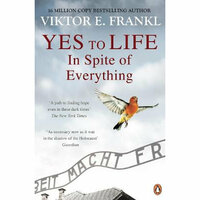You need to sign in or sign up before continuing.
Take a photo of a barcode or cover
dark
hopeful
reflective
sad
tense
slow-paced
emotional
hopeful
inspiring
reflective
sad
emotional
inspiring
sad
Succinct and powerful, Dr Frankl exposes here his argument about the meaning of life - despite hardships and unthinkable suffering - across 3 lectures presented in 1946.
His books literally change my life...what else can I say?
emotional
informative
inspiring
medium-paced
challenging
emotional
inspiring
reflective
medium-paced
Gratitude to Dr. Frankl for giving these lectures and to his The Viktor Frankl Institute for compiling them into book form, and for translating them into English. Providing strength and living inspiration for the journey ahead - as the US moves into such dark times!
Graphic: Suicidal thoughts, Suicide attempt
hopeful
informative
inspiring
fast-paced
Yes to Life: In Spite of Everything is a slender book with immense weight. Drawn from lectures Viktor Frankl gave in Vienna in 1946—barely a year after surviving the concentration camps—it offers a raw, urgent meditation on suffering, resilience, and the will to find meaning.
What struck me most deeply is Frankl’s unwavering insistence that life is worth saying ‘yes’ to, not despite its difficulties, but because of them. He writes that suffering is not inherently meaningful, yet it always holds the potential for meaning if we can respond with courage, responsibility, and love. This subtle distinction was powerful for me. It reminded me that meaning is not passively waiting to be uncovered; it is actively created by how we choose to bear the weight of our circumstances.
Another insight that resonated was Frankl’s challenge to our modern obsession with pursuing happiness directly. He suggests that happiness cannot be chased; it ensues as the byproduct of dedicating ourselves to something beyond ourselves—whether a person we love, a cause we serve, or even the grace with which we meet unavoidable suffering.
If I have any reservation, it’s only that the book’s brevity sometimes leaves these rich ideas more suggested than deeply unpacked. Still, that sparseness also gives them a haunting power. Frankl does not embellish; he writes like someone who has stared into the abyss and returned with truths too essential for ornament.
I give this book 4.5 stars. It is both timeless and urgently relevant—a slender volume that invites us to keep saying yes to life, even when circumstances seem to scream otherwise. I closed it reminded that even when we cannot change our situation, we are still free to change ourselves, to choose our stance, and to turn unavoidable suffering into an opportunity for profound human growth.
What struck me most deeply is Frankl’s unwavering insistence that life is worth saying ‘yes’ to, not despite its difficulties, but because of them. He writes that suffering is not inherently meaningful, yet it always holds the potential for meaning if we can respond with courage, responsibility, and love. This subtle distinction was powerful for me. It reminded me that meaning is not passively waiting to be uncovered; it is actively created by how we choose to bear the weight of our circumstances.
Another insight that resonated was Frankl’s challenge to our modern obsession with pursuing happiness directly. He suggests that happiness cannot be chased; it ensues as the byproduct of dedicating ourselves to something beyond ourselves—whether a person we love, a cause we serve, or even the grace with which we meet unavoidable suffering.
If I have any reservation, it’s only that the book’s brevity sometimes leaves these rich ideas more suggested than deeply unpacked. Still, that sparseness also gives them a haunting power. Frankl does not embellish; he writes like someone who has stared into the abyss and returned with truths too essential for ornament.
I give this book 4.5 stars. It is both timeless and urgently relevant—a slender volume that invites us to keep saying yes to life, even when circumstances seem to scream otherwise. I closed it reminded that even when we cannot change our situation, we are still free to change ourselves, to choose our stance, and to turn unavoidable suffering into an opportunity for profound human growth.
challenging
hopeful
informative
inspiring
reflective
slow-paced
emotional
hopeful
informative
inspiring
reflective
sad
fast-paced
Quotes that stood out to me, and remain extremely relevant:
“[He] studied cruelty and hatred. And he found one of the roots of such evil to be the turning away, choosing not to see or know of bystanders. That not knowing was read by perpetrators as a tacit approval.”
“[He] studied cruelty and hatred. And he found one of the roots of such evil to be the turning away, choosing not to see or know of bystanders. That not knowing was read by perpetrators as a tacit approval.”
“The underlying motive for not knowing, he points out, is to escape any sense of responsibility or guilt for those crimes.”
Graphic: Suicide





